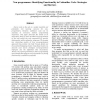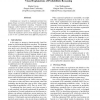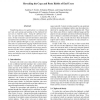VL
2009
IEEE
14 years 6 months ago
2009
IEEE
Source code on the web is a widely available and potentially rich learning resource for nonprogrammers. However, unfamiliar code can be daunting to end-users without programming e...
VL
2009
IEEE
14 years 6 months ago
2009
IEEE
Designers’ extensive software needs have not been adequately documented in the research literature, and are poorly supported by software. Without appropriate tools to support th...
VL
2009
IEEE
14 years 6 months ago
2009
IEEE
Understanding and maintaining the structure of large ontologies is a cognitively demanding task. Visualizations are commonly used as a cognitive aid for presenting large ontologie...
VL
2009
IEEE
14 years 6 months ago
2009
IEEE
This paper explores the potential for simplified programming languages to support the development of computational thinking skills in non-programmers. We suggest that novice progr...
VL
2009
IEEE
14 years 6 months ago
2009
IEEE
Continuing our research in explanation-oriented language design, we present a domain-specific visual language for explaining probabilistic reasoning. Programs in this language, c...
VL
2009
IEEE
14 years 6 months ago
2009
IEEE
Transferring data across applications is a common end user task, and copying and pasting via the clipboard lets users do so relatively easily. Using the clipboard, however, can al...
VL
2009
IEEE
14 years 6 months ago
2009
IEEE
In many domains, decision makers want to find and understand patterns of events as these patterns often give insight into the causal relationships among events. Current systems to...
VL
2009
IEEE
14 years 6 months ago
2009
IEEE
Little is known about the formation of people’s first perceptions about computers and computer code, yet it is likely that these impressions have a lasting effect on peoples’ ...



